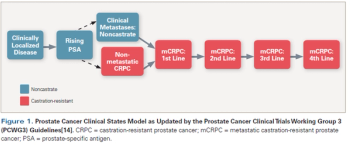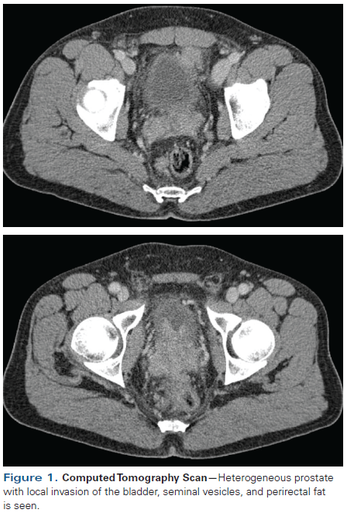
Men with high-risk nonmetastatic CRPC should if possible be enrolled in a clinical trial and that patients with low-risk disease can be safely observed.

Your AI-Trained Oncology Knowledge Connection!


Men with high-risk nonmetastatic CRPC should if possible be enrolled in a clinical trial and that patients with low-risk disease can be safely observed.

Combination therapy with bicalutamide and everolimus resulted in promising responses in a phase II trial of patients with castration-resistant prostate cancer, though a substantial proportion of patients experienced everolimus-related toxicities.

Twelve US lawmakers have asked the Obama administration to scrutinize the pricing of the prostate cancer agent enzalutamide and to consider licensing its generic production.

Men who receive pharmacologic androgen deprivation therapy as part of their treatment for prostate cancer may be at higher risk for depression.

Results of a phase II randomized trial found that combining a short course of androgen deprivation therapy with bevacizumab improved relapse-free survival in men with hormone-sensitive prostate cancer.

Researchers at UCLA are reporting that prostate adenocarcinoma and neuroendocrine prostate cancer can arise from a common epithelial clone.

A study published in Nature Medicine reports that suppressing the nuclear receptor protein ROR-γ with small-molecule compounds may reduce AR levels in CRPC and stop tumor growth.

Using simulation modeling, researchers found that PSA screening can be cost-effective if men with low-risk prostate cancer do not undergo treatment and if clinicians use restrictive criteria to make a decision to biopsy.

The phase III HYPRO study failed to prove the non-inferiority of using hypofractionated radiotherapy compared with fractionated radiotherapy for late genitourinary and gastrointestinal toxicity in men with intermediate- or high-risk prostate cancer.

The population of patients with intermediate-risk prostate cancer are a large and heterogeneous group with highly variable prognoses, which present a challenge to efforts to develop standardized treatment recommendations.

We must now come to a uniform consensus regarding the descriptions of these risk groups in order to truly determine which treatments have the best oncologic efficacy, while minimizing overtreatment and optimizing patients’ quality of life.

Long-term regular use of low-dose aspirin was associated with a decreased risk of prostate cancer in individuals with cardio- or cerebrovascular disease.

A large cohort study showed that the risk of colorectal cancer is increased following a diagnosis of prostate cancer, suggesting colorectal cancer screening should be considered following a prostate cancer diagnosis.

Men who receive radiation therapy as treatment for their prostate cancer may have an increased risk of developing a secondary cancer, according to a meta-analysis of observational studies.

Analyses from the phase III ALSYMPCA trial showed that treatment with radium-223 resulted in quality-of-life improvements over placebo in patients with castration-resistant prostate cancer and symptomatic bone metastases.

A panel of experts at the ASCO have reviewed and endorsed Cancer Care Ontario’s guideline on Active Surveillance for the Management of Localized Prostate Cancer.

Abituzumab did not extend progression-free survival in patients with castration-resistant prostate cancer, though it did improve bone lesion progression.

We present a joint perspective from the medical oncology and urologic disciplines on the ongoing efforts to advance clinical trial performance in order to discover new therapies for this fatal disease.

The great strength of the PCWG3 is the recognition that second- , third- , and fourth-line treatments offer new possibilities for extending overall survival.

The 2012 change in guidelines regarding PSA testing for prostate cancer had a different effect on testing rates depending on which physician specialty was doing the testing.

Combined use of systematic and targeted magnetic resonance-ultrasound–guided fusion biopsy was effective in diagnosing clinically significant prostate cancer.

More than 15% of men and women over the age of 65 may have received breast or prostate cancer screening not recommended by current guidelines.

A 55-year-old Hispanic male presents with a family history of gastric cancer in one sibling and prostate cancer in an older brother. CT performed in March 2015 for IMT surveillance showed a heterogeneous prostate with local invasion involving the bladder, seminal vesicles, and perirectal fat.

BRCA mutations and co-occurring gene alterations in prostate cancer suggest that some patients might benefit from oral poly (ADP-ribose) polymerase (PARP) inhibitors.

Results from the large STAMPEDE trial suggest that the combination of zoledronic acid and celecoxib along with standard of care could improve failure-free survival in prostate cancer patients starting hormone therapy whose disease has metastasized.